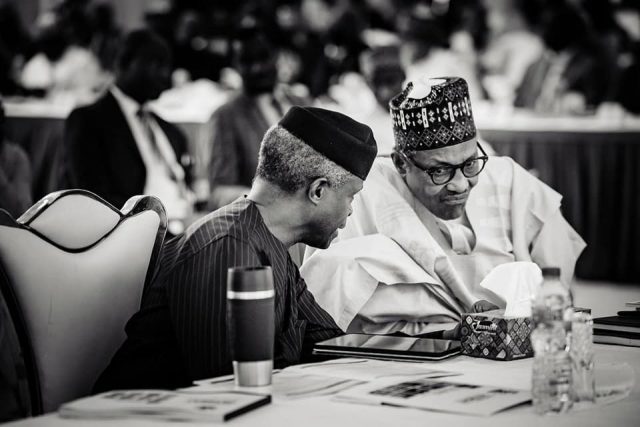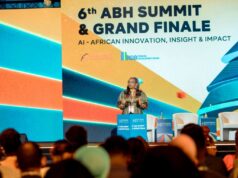TUE, 18 OCT, 2022-theGBJournal| As the Buhari administration takes stock of its achievements over the years, Vice President Yemi Osinbajo, SAN, has listed interventions in infrastructure, power, digital economy, ease of doing business and social investment, as some of the regime’s game-changing accomplishments.
Prof. Osinbajo stated this on Monday in his presentation at the opening of the 3rd Ministerial Performance Review Retreat in Abuja.
The game-changing achievements of the administration listed by the Vice President include:
First is the development of infrastructure (roads, rail, power, and broadband infrastructure), especially the creativity introduced to infrastructure financing. In this regard he noted the financing menu which the administration adopted which includes the Road Infrastructure Development and Refurbishment Investment Tax Credit Policy.
‘’This has incentivized the construction of over 1,500km of critical roads in key economic corridors. Under this scheme, the Dangote Group has substantially completed the reconstruction of the 34km Apapa-Oworonshoki-Ojota Expressway and the 43km Obajana-Kabba Road.’’
Similarly, Nigeria LNG Limited is on track to complete the 38km Bodo-Bonny Road and Bridges Project by the end of 2023. Recently, the President gave approval to MTN to construct the N202billion Enugu-Onitsha Road.
The second on the menu is the Presidential Infrastructure Development Fund (‘PIDF’) managed by the Nigeria Sovereign Investment Authority, NSIA where the government have leveraged more than $1billion in financing to facilitate the accelerated completion of the Second Niger Bridge, Lagos-Ibadan Expressway and Abuja-Kano Road.
The third is the Sukkuk Funds, and the fourth is the Infrastructure Corporation of Nigeria (‘InfraCorp’) established in 2021 with a seed capital of N1trillion from the Central Bank of Nigeria CBN, NSIA and the Africa Finance Corporation, AFC. All of these are the innovative ways we are able to fund infrastructure outside of the budget.
The power sector interventions and initiatives (Solar Naija Programme launched under the Economic Sustainability Plan which include the improvement in generating capacity, the 266 Captive Power Plants and 16 Embedded Power Plants etc)
The second game-changing achievement is the digital economy. First is the rapid expansion of Broadband access. In August 2019, the broadband coverage was 33.7% and today it is 44.65%, representing close to 13 million new broadband users. There were 13,823 4G base stations and we now have 36,751, representing a 165.86% increase.
The percentage of 4G coverage across the country also increased from 23% to 77.52%. The expansion has also been helped by the Ministry of Communications and Digital Economy directly engaging the States on the right-of-way policy with a view to persuading them to reduce the rates charged for laying fibre optic cables to as low as N140 per metre.
The third game-changing achievement is the Ease of Doing Business Reforms. PEBEC, has since 2016 implemented 160 reforms. These include digitization of company registration, tax payment, and the visa-on-arrival process. Legislative reforms with the active collaboration of the National Assembly which includes The Secured Transaction in Movable Asset Act 2017 and the Credit Reporting Act, 2017.
The fourth is in that area of Social Investment Programme (award-winning microcredit scheme for informal traders under the Government Enterprises and Empowerment Programme, N-Power and School Feeding Programme etc).
This led to the deployment of the largest Social Investment Programme in sub-Saharan Africa, with a budgetary provision of N500 billion, at the time that was close to $2 billion. Since 2016, we have included almost N500 billion in every budget and are now in closer to N1 trillion. It includes Conditional Cash Transfers to over two million of the poorest benefitting from a bi-monthly stipend of N10,000.
The National Social Register now contains 46million persons in over 11 million poor and vulnerable households from across the Federation. A School Feeding Programme for public primary schools, now feeding close to 10million school children across the country.
The Vice President also spoke on the need to ensure synergy between fiscal and monetary policy in order to better manage the economy and exchange rate concerns. He noted that the failure of that synergy has led to unnecessary drawbacks in our economic performance and planning.
‘’What imports are eligible for foreign exchange must agree with the fiscal ambitions for manufacturing and industry. It cannot be the province of monetary policy alone or the province of fiscal policy alone.’’
He said: “the discussion that we must now have and going forward is how best to manage the situation by finding a mechanism for increasing supply and moderating demand which will be transparent and will boost confidence.
“I think that a more market-driven approach will be best, some price discovery within the context of a managed float is certainly required.”
The Vice President thinks that a more market-driven approach will be best, some price discovery within the context of a managed float is certainly required.
‘’Some efforts at controlled price discovery that had been made in the past include the Foreign Exchange Market (FEM), Interbank Foreign Exchange Market (IFEM), various iterations of the DutchAuction System (DAS), Wholesale Dutch Auction System (W-DAS), Retail Dutch Auction System (R-DAS).
While they may not have been perfect, it would appear as if the rules were clear and there was relative stability. When people know how they can access foreign exchange competitively, this will boost confidence and inward flows will increase.’’
The VP also spoke on the issue of value addition and productivity ‘’in our economy’’ which he says the country must focus on.
‘’This happily is well articulated in our Medium-Term Economic Plan 2021-2025. We must in doing so, loosen the generalised restrictions on trade.’’
He said: ‘’Blanket import restrictions are a dampener on economic activity because a lot of items that might be needed in the manufacturing process might be affected with a consequent negative impact on value addition in the economy.
Importation itself is not the problem, it is what you import and what you do with it. It is the value added that matters. This is how jobs and wealth are created. Many countries of the world that manufacture are huge importers, and they import far more than Nigeria. Let us take the example of garment manufacturing. Bangladesh the world’s leading garment manufacturer does not produce most of the cotton it uses. It only grows 2% of its annual cotton requirement.
In 2019 Bangladesh imported $11.8 billion dollars worth of textiles and apparel while it exported $37.94 billion dollars worth of garments in the same year. It is clear that there is nothing wrong with importation if you are going to add value and will export. I think that we should focus on doing that.
Finally, a valuable lesson that we must draw from our efforts over the life of this administration is that coherence and coordination are essential for effective policy implementation. It is important for government policies to be coherent otherwise different parts of the government could end up adopting diametrically opposed policies. I think that one of the very important steps that Mr. President has taken is the establishment of the Delivery Unit in the Presidency.
I believe we have done well with regard to using planning as a form of promoting coherence in policy-making and implementation. This is reflected by the adoption of the Economic Recovery and Growth Plan, the Economic Sustainability Plan in response to COVID-19, the National Development Plan 2021-2025, and ongoing work on Nigeria Agenda 2050.
The broad consultative processes involved in drawing up these plan documents help improve understanding of government intentions and direction even by public servants but certainly also by the private sector and the general populace. Planning also means that there is a process by which incompatible policies are re-aligned and re-positioned.
Closely related to coherence is coordination. It is important to coordinate the implementation of government policy very closely. Apart from the benefits of several viewpoints being taken into account, the coordination of economic activity enables key economic managers to know how to help their colleagues achieve common objectives.
The truth is that working in silos or going it alone can have deleterious effects on policy implementation. Very closely tied to coordination is strong public sector capacity and it is pleasing to note that the Office of the Head of the Civil Service of the Federation has been proceeding apace with the Federal Civil Service Strategy and Implementation Plan.
I think that one of the important steps that Mr. President took in 2016, and I believe I won’t be accused of being self-serving here, is constituting the Economic Management Team under the Office of the Vice President. I think that was an administratively sound and wise decision indeed because constitutionally, the VP’s Office is Chair of the National Economic Council, Chair of the National Planning Commission, and Chair of the National Council on Privatization which is the Bureau of Public Enterprises.
Because of the strong economic position that the Office of the Vice President has been placed in constitutionally, it makes perfect sense for the office to be the inter-ministerial coordinator of the Economic Management Team. I believe Your Excellency acted very wisely and rightly indeed. I commend this to future administrations and to the incoming President and Vice President.’’
Twitter-@theGBJournal| Facebook-The Government and Business Journal|email: gbj@govbusinessjournal.ng|govandbusinessj@gmail.com










